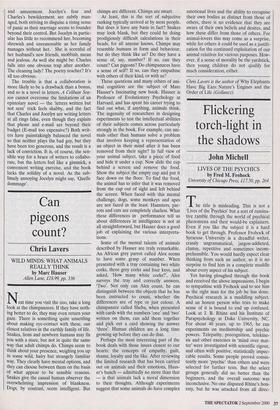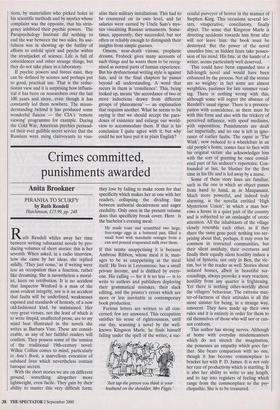Flickering torch-light in the shadows
John Michell
LIVES OF THE PSYCHICS by Fred M. Frohock University of Chicago Press, £17.50, pp. 264 The title is misleading. This is not a `Lives of the Psychics' but a sort of rumina- tive ramble through the world of psychical phenomena and their would-be explainers. Even if you like the subject it is a hard book to get through. Professor Frohock of Syracuse. University is a dreadful writer, crassly ungrammatical, jargon-addicted, clumsy, repetitive and sometimes incom- prehensible. You would hardly expect clear thinking from such an author, so it is no surprise to find him in a complete muddle about every aspect of his subject.
Yet having ploughed through the book and received the above impressions, I begin to sympathise with Frohock and to see him as the right man for the job he has done. Psychical research is a muddling subject, and an honest person who tries to make sense of it is bound to end up confused. Look at J. B. Rhine and his Institute of Parapsychology at Duke University, NC. For about 40 years, up to 1965, he ran experiments on mediumship and psychic powers. Telepathy, precognition, telekine- sis and other exercises in 'mind over mat- ter' were investigated with scientific rigour, and often with positive, statistically impec- cable results. Some people proved consis- tently more 'psychic' than others and were selected for further tests. But the select groups generally did no better than the beginners, and the overall outcome was inconclusive. No one disputed Rhine's hon- esty, but he was attacked from all direc- tions, by materialists who picked holes in his scientific methods and by mystics whose complaint was the opposite, that his strin- gency inhibited their psychic powers. The Parapsychology Institute did nothing to end the war between the two sides. Its use- fulness was in showing up the futility of efforts to enfold spirit and psyche within the straitjacket of science. Life is full of coincidences and other strange things, but they do not take place in a laboratory.
If psychic powers and forces exist, they can be defined by science and perhaps put to good, practical use. That is the reduc- tionist view and it is surprising how influen- tial it has been on researchers over the last 100 years and more, even though it has constantly led them nowhere. The misun- derstanding behind it has produced some wonderful fiascos — the CIA's 'remote viewing' programme for example. During the Cold War, American psychics persuad- ed their ever gullible secret service that the Russians were using clairvoyants to visu- alise their military installations. This had to be countered on its own level, and fat salaries were earned by Uncle Sam's mys- tics visualising Russian armaments. Some- times, apparently, they succeeded, but not often or reliably enough to distinguish their insights from simple guesses.
Omens, near-death visions, prophetic dreams, Frohock gives many accounts of such things and he wants them to be recog- nised as normal parts of human experience. But his dysfunctional writing style is against him, and in the final chapters he passes beyond all understanding. A word that recurs in them is `consilience'. This, being looked up, means 'the accordance of two or more inductions drawn from different groups of phenomena' — an explanation that requires another. What he seems to be saying is that we should accept the para- doxes of existence and enlarge our world-. view to accommodate them. If that is his conclusion I quite agree with it, but why could he not have put it in plain English?



























































 Previous page
Previous page